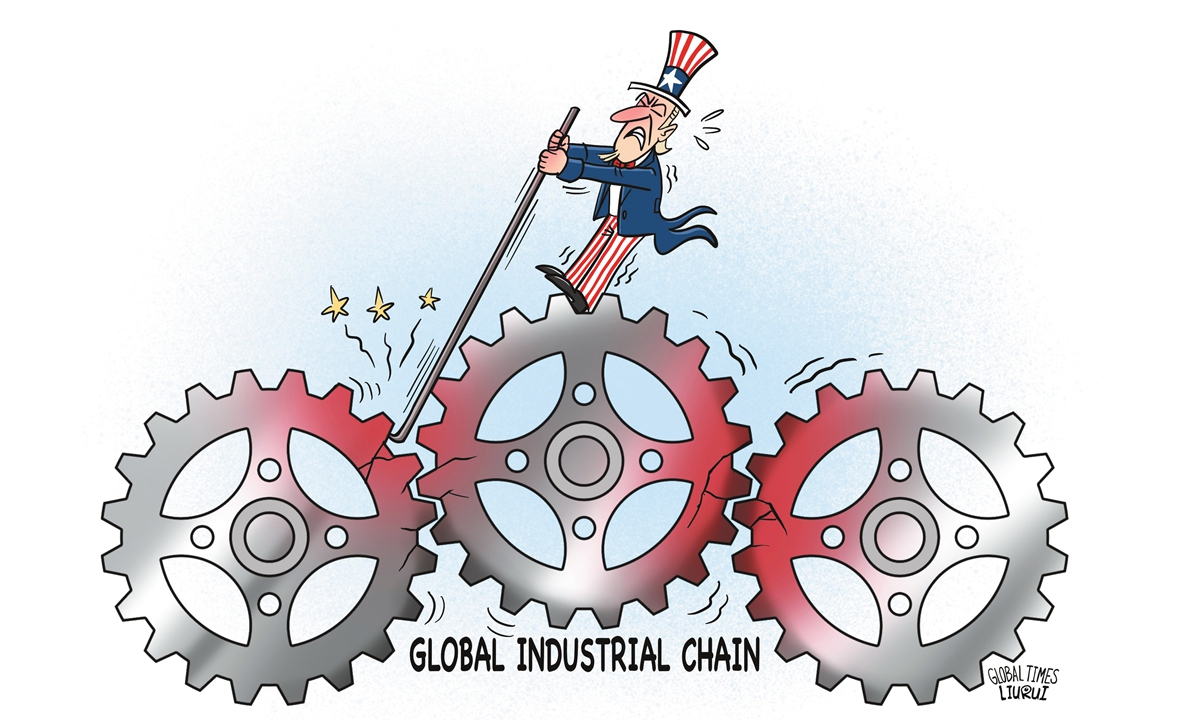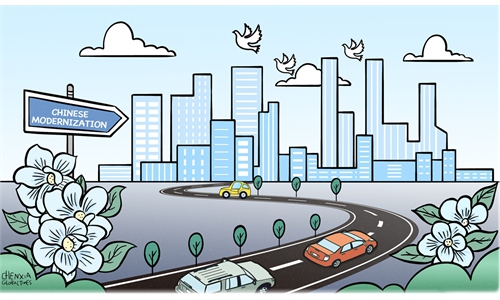
Illustration: Liu Rui/GT
Recently, after launching a war of "reciprocal tariffs" around the world, the US has been mobilizing an encirclement to contain and suppress China through continuous pressure on other countries. For instance, reports show that the US plans to pressure governments to restrict trade with China in exchange for exemptions to US tariffs. However, this time, US allies, including the EU and Japan, refrained from unquestioningly following suit. The EU said it will not decouple from the Chinese economy; Japan reportedly intends to push back against any US effort to bring it into an economic bloc aligned against China.
In shows that the US' coercion of other countries to exert maximum pressure on China is unwelcome.
To begin with, the world is increasingly recognizing that there is little profit in aligning with the US. Seeking "winner-take-all" in all fields, the US under the current administration believes that using the "stick" to pry other countries to unilaterally serve its interests is the "most cost-effective deal." Thus, whether through wielding the stick of protectionism to seize open markets or tariff revenues, or demanding that Asian economies continue to invest in high-end manufacturing industries like semiconductors, it all represents the US' concentrated effort to maintain its hegemony at the lowest possible economic cost.
In this context, countries will be compelled to reevaluate the cost-benefit analysis of aligning with the US, as they come to the realization that unilaterally sacrificing their interests yields no return and, in fact, only serves to fuel the US' insatiable demands.
Second, China is poised to play a bigger role in driving global economic growth. Washington's tariff war will not only be unable to cure the country's own problems, but will instead create risks in terms of rising inflation, suppressed consumption and financial market turmoil. Recent economic forecasts by the International Monetary Fund show that due to uncertainties caused by the US tariffs, global growth is now projected to reach only 2.8 percent this year, while US growth forecast has been sharply downgraded from 2.7 percent to 1.8 percent. This reflects the risks caused by the US' efforts to "turn the clock back" regarding global trade, which is seriously weakening the appeal of the US market to the world and the country's role in the industrial chain.
The door of the Chinese market is always open for the whole world, and it is willing to work with other countries to maintain a mutually beneficial, win-win, open and inclusive international economic order. Meanwhile, Chinese modernization, the country's large-scale market and the innovative environment brought by the Chinese economy's new quality productive forces can continue to provide countries with multi-dimensional development opportunities as well as economic, trade and investment dividends. Countries are accelerating the construction of diversified trade networks and reducing their dependence on the US market.
It is worth noting that in terms of economic matters, the existing public opinion in some countries and regions is undergoing a shift in connotation. The EU, for example, has long used "de-risking" as a keyword in its economic strategy toward China. As the negative effects of US policies spill over to the global economy and security increasingly, some European media outlets have proposed that the "de-risking" strategy should also be applied to the US.
The signal released by the EU recently indicated that it will continue to assess and adjust its economic relations with its partners in terms of "de-risking." This also means that it is not in the bloc's interest to follow the US regardless of principle, let alone to make concessions on its core interests that will harm itself.
It can be said that the policy choices of Europe, the most important ally of the US in the eight decades since World War II, is a microcosm of its reaction to the US' "coercive diplomacy," showing that the pursuit of "strategic autonomy" and balance in foreign relations is still the rational way forward.
In fact, amid the increasing turmoil in geopolitics, all countries need to assess the credibility and degree of their own resilience and external dependence.
As the US continues to bring more chaos, further strengthening dependence on the country is likely to increase the risk of being exposed to more coercion.
The author is an associate research fellow at the Belt and Road Academy of Beijing Language and Culture University. opinion@globaltimes.com.cn



